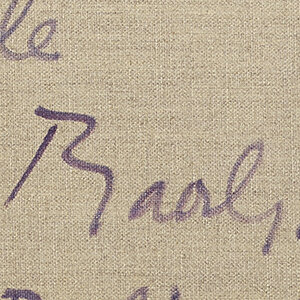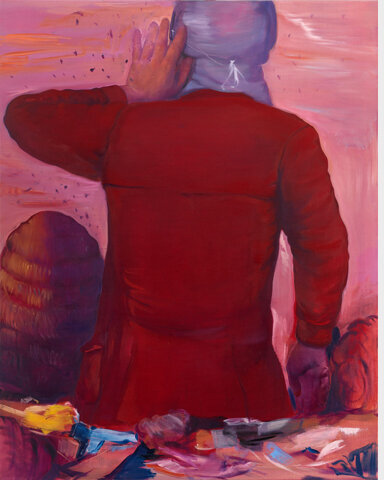


Last updated on Sun 1 October, 2017


SAID BAALBAKI
“UMBRUCH”
OCTOBER 2017
In July of this year, the German-Lebanese artist Said Baalbaki successfully completed his studio scholarship on the roof of the Federal Foreign Office in Berlin as part of the Artist in Residence Programme in cooperation with the Landesverband Berliner Galerien (lvbg). The programme also includes an exhibition in the respective gallery of the artist in the year of his scholarship to provide further insights into the oeuvre. The exhibition, “Umbruch”, now represents his return to his painterly work, when Baalbaki realised his conceptual project COOKWAR (E)-101, in which he transformed kitchen utensils such as pots, pans and cutlery into military objects such as armour, shields and helmets. Both artistic expressions are characteristic of Baalbaki, complementing each other and parallels in their theme world.
With his childhood and adolescence shaped by the experiences of the Lebanese civil war, Baalbaki’s current pictures address the absurdity of war and violence, humanitarian questions of loss and identity, greed and power, religious and cultural issues and profound change in the political, economic and social order. He devotes himself consistently to these themes through various motifs, which are an integral part of his visual language. For example, with everyday items such as suitcases and books he shapes “Mon (t) Liban”, which recall the legendary mountains of Lebanon, which have been praised in the Bible.
Another important reference of the presented pieces is art history itself: Baalbaki finds inspiration, for example, in the artworks by Goya, Bruegel and Duchamp. The monumental back figure in “Le Bilboquet” recalls the “Colossus” (1810) by Francisco de Goya, whose artistic confrontation with questions of power, occupation and violence the artist shares. The nightmarish, crouching back figure with the money bag and the flatterers in the central picture “Der Bestecher”, after Pieter Bruegel the elder, visualises another side of power, which is closely linked to money and the greed for it. Painting itself becomes an affirmative organic process against destruction and expulsion. It not only raises existential humanitarian questions, but also conveys the poetry of a pictorial utopia.
Said Baalbaki (born 1974 in Beirut), lives and works in Berlin; he studied at the Beaux-Arts Institute in Beirut, at the Khalid Shoman Foundation, Darat al Funun in Amman with Marwan (Summer Academy), and 2002-2005 at UdK Berlin, where he graduated from the masterclass of Burkhard Held. From 2006 to 2008, he graduated from the Institute of Art in the context of the UdK with a Master of Arts degree in which he deepened the location of artistic work in a social context. Collections et al: Barjeel Art Foundation, Sharjah, United Arab Emirates; British Museum, London; Fondation Louis Vuitton, Paris; Collection Solidere, Beirut; Sursock Museum and Saradar Collection, Beirut; Collection Till Richter Museum, Buggenhagen, Germany as well as in international private collections.
Join us in our endless discovery of modern and contemporary Arab art